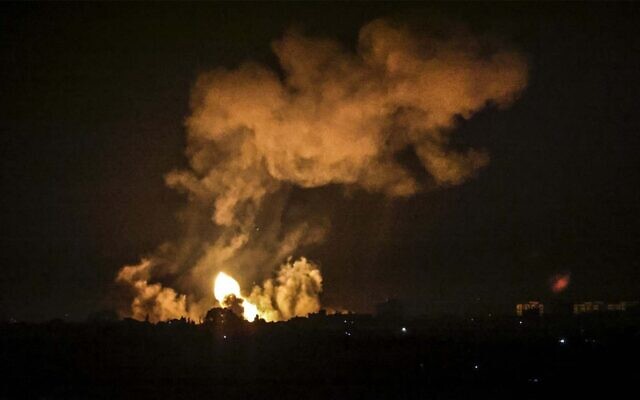While IDF reportedly doesn’t believe terror group’s members launched rocket, army says it holds enclave-ruling group responsible; no immediate reports of injuries or damages

The Israeli military struck targets in the Gaza Strip after midnight on Tuesday in response to a rocket fired from the Hamas-controlled enclave hours earlier.
The rocket attack was the first in nearly four months, ending one of the longest periods of quiet on the Gaza border in years.
The Israeli military said in a statement that it bombed a number of targets, including a site used by Hamas to manufacture weapons. Hamas-affiliated media reported that the Israeli airstrikes targeted a site operated by Palestinian factions west of Khan Younis in the southern Gaza Strip.
There were no immediate reports of injuries or damages.
“The IDF considers Hamas responsible for what unfolds in the Gaza Strip,” the army said.
Hamas spokesman Hazem Qassem sought to downplay the strikes, “the Zionist bombing of some empty sites [is] a failed attempt to prevent our Palestinian people from defending the city of Jerusalem.”
شاهد طائرات الاحتلال تستهدف محيط موقع القادسية غرب محافظة خانيونس pic.twitter.com/DlYtnjBitL
— حسن اصليح | Hassan (@hassaneslayeh) April 18, 2022
Hamas’s military wing claimed it launched anti-aircraft missiles at the incoming Israeli warplanes. The IDF did not mention any damages to its own aircrafts in the attack.
The rocket fired at southern Israel on Monday evening was intercepted by the Iron Dome air defense system.
There were no reports of injuries as a result of the attack. The Eshkol regional council said there was no change in instructions for residents.
Following the rocket firing, Prime Minister Naftali Bennett, Defense Minister Benny Gantz, and military chief Aviv Kohavi held a meeting to discuss a potential response, according to Hebrew-language media reports.
The attack came amid escalating Israeli-Palestinian tensions, following clashes and violence in the Old City of Jerusalem, a series of deadly Palestinian terror attacks and stepped up IDF activity against terror groups in the West Bank.
There was no immediate claim by any of the Gaza-based terror groups for the rocket fire. Palestinian sources cited by the Kan public broadcaster and the Ynet news site said the Palestinian Islamic Jihad was believed to be behind the attack.
After the rocket fire, Hamas reached out to Israel through Egyptian mediators in order to stress that it wasn’t interested in further escalation and had not been behind the attack, according to Kan.
עוד תיעוד מרצועת עזה הלילה. תקיפת אתרים של הפלגים הפלסטינים. נכון לעכשיו אין דיווח על נפגעים. יותר מוקדם דיווחו בעזה כי חמאס והגיהאד פינו מפקדות מחשש לתגובה ישראלית. pic.twitter.com/5rry5jPDMi
— Jack khoury.جاك خوري (@KhJacki) April 18, 2022
In the past, Israel has responded with airstrikes against sites belonging to Gaza’s rulers, Hamas, regardless of the group launching the attack. More rarely, it has directed its response at Islamic Jihad, if the terror group claimed responsibility. It is largely believed that Hamas has enough of a stronghold in the enclave that no rival group would fire at Israel without the ruling group’s tacit approval, at the very least.
The last time rockets were fired from the coastal enclave toward Israel was on January 1, 2022. At the time, no sirens sounded as the two rockets landed in the sea off the coast of Tel Aviv. Still, the IDF responded with a series of airstrikes against Hamas targets.
On Sunday afternoon, sirens sounded in the town of Nahal Oz, in what the IDF said was a false alarm.
The last few days have seen violent clashes between Palestinians and police on the Temple Mount in Jerusalem, leading to the injury of dozens of Palestinians and several police officers.
Hamas and other Gaza-based terror groups have repeatedly invoked the flashpoint holy site as a red line. Police actions to quell riots there last year were among the triggers of an 11-day war in Gaza last May.
As reported by The Times of Israel
